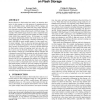Free Online Productivity Tools
i2Speak
i2Symbol
i2OCR
iTex2Img
iWeb2Print
iWeb2Shot
i2Type
iPdf2Split
iPdf2Merge
i2Bopomofo
i2Arabic
i2Style
i2Image
i2PDF
iLatex2Rtf
Sci2ools
107
Voted
PVLDB
2008
2008
Online maintenance of very large random samples on flash storage
Recent advances in flash media have made it an attractive alternative for data storage in a wide spectrum of computing devices, such as embedded sensors, mobile phones, PDA's, laptops, and even servers. However, flash media has many unique characteristics that make existing data management/analytics algorithms designed for magnetic disks perform poorly with flash storage. For example, while random (page) reads are as fast as sequential reads, random (page) writes and in-place data updates are orders of magnitude slower than sequential writes. In this paper, we consider an important fundamental problem that would seem to be particularly challenging for flash storage: efficiently maintaining a very large (100 MBs or more) random sample of a data stream (e.g., of sensor readings). First, we show that previous algorithms such as reservoir sampling and geometric file are not readily adapted to econd, we propose B-FILE, an energy-efficient abstraction for flash media to store self-expi...
Flash | Flash Media | Flash Storage | PVLDB 2008 |
| Added | 28 Dec 2010 |
| Updated | 28 Dec 2010 |
| Type | Journal |
| Year | 2008 |
| Where | PVLDB |
| Authors | Suman Nath, Phillip B. Gibbons |
Comments (0)

